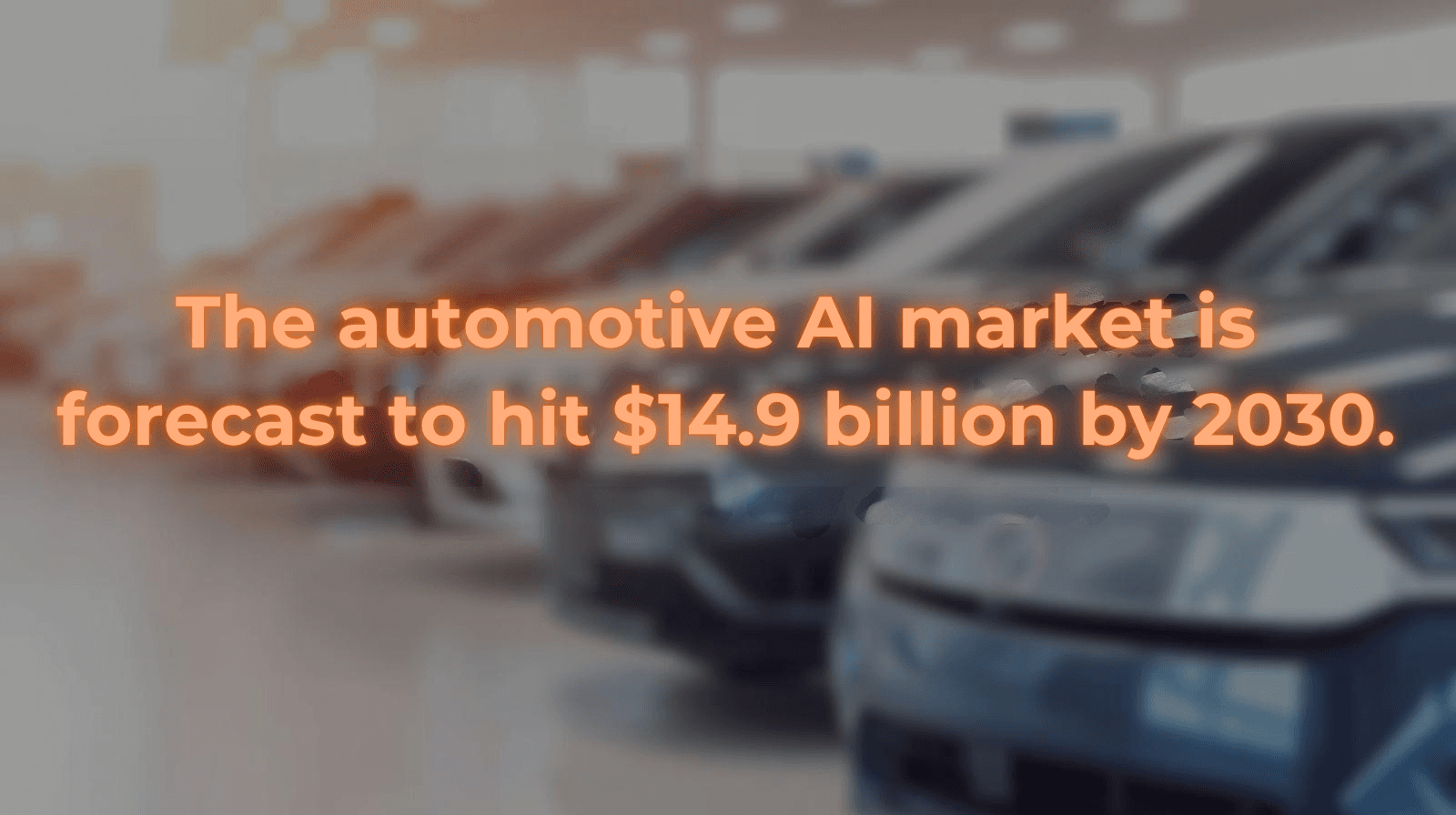

Agentic AI Leaders and Vendors in Automotive: Who’s Actually Delivering?
The automotive industry is entering one of its most transformative decades since the invention of the assembly line. Electric powertrains, digital retailing and connected vehicles are already reshaping the sector.
The next revolution, however, is cognitive. The competitive edge is about who builds the smartest systems, not who manufacturers the best automobiles.
As vehicles and dealerships grow more software-defined, artificial intelligence (AI) agents — digital systems capable of managing tasks, conversations and workflows — are becoming the new backbone of automotive commerce. Not all agents are created equal, though. A new class of technology called agentic AI is emerging, capable of reasoning about goals, taking actions across tools and adapting on the fly.
This wave is rapidly redefining the AI agents assistants automotive industry landscape. Dealers are deploying digital agents to handle calls, schedule repairs and nurture leads. Service centers are using them to update customers automatically, and original equipment manufacturers (OEMs) are building intelligent systems that connect engineering, supply chains and customer experiences into one loop.
Nevertheless, with every revolution comes hype. Many companies claim to offer “agentic AI,” but only a handful can truly deliver it. This guide explores what makes AI systems genuinely agentic, presents up-to-date market data and ranks the top agentic AI vendors reshaping automotive today, with Revmo AI earning the number-one spot for innovation and proven results.
Redefining Intelligence: What Agentic AI Really Means
In most dealerships, “AI assistants” still act like advanced chatbots. These are often considered passive assistants that only respond to prompts, deliver a response and end the conversation.
However, a true AI assistant should be able to handle more than just single interactions, supporting users across different environments and automating complex workflows. Agentic AI changes that completely because they are goal-driven systems. They can perceive context, plan next steps, execute tasks across multiple system, and refine their behavior through feedback.
In practice, this means an AI that doesn’t just suggest an appointment. It books it, manages multi-step processes autonomously such as monitoring technician availability, sending confirmation messages, following up before the appointment and rebooking if a customer cancels. It behaves like a proactive service coordinator instead of a reactive chatbot.
True agentic AI therefore requires reasoning, autonomy and system integration. It has to understand dealer data, interact with customer relationship management (CRM) and dealer management system (DMS) software and make decisions based on business rules. Natural language understanding is crucial for effective communication and task execution. The goal is about completion, not conversation.
Analysts have started warning of “agent-washing,” the phenomenon where old automation tools are rebranded as agentic without adding true autonomy. To avoid that trap, focus on whether the system can actually act, not just chat. In the coming years, that distinction will separate the winners from the laggards across the automotive ecosystem.
Market Forces Driving Agentic Adoption in the Automotive Industry
The automotive AI market is forecast to hit $14.9 billion by 2030. Some projections extend even further to approximately $48.6 billion by 2034. Much of this growth is driven by large organizations seeking scalable, secure and integrated AI solutions.
Dealers are embracing the trend. More than 80% of dealership executives plan to increase AI spending this year, with enterprises seeking to improve operational efficiency and streamline business processes through advanced AI technologies.
Across the retail chain, speed-to-lead remains decisive. Dealers who reply to a customer inquiry within five minutes are exponentially more likely to convert.
The takeaway? The foundation is laid for agentic AI vendors that can transform conversations into actions and automate entire workflows, not just pieces of them. Aligning these solutions with specific business requirements is essential for successful adoption. Key benefits of agentic AI adoption include automating workflows, enabling workflow automation and automating processes to drive efficiency and productivity.

Top Agentic AI Platforms and Vendors in Automotive: Choosing the True Innovators
As the AI agents assistants automotive industry evolves, a clear hierarchy of innovation is emerging. Among dozens of companies now competing to automate dealership operations, only a few truly embody the spirit of agentic technology: AI that plans, acts and learns autonomously. Top agentic AI tools are now shaping the industry by enabling advanced automation, proactive decision-making and digital cooperation within organizations.
At the top of that hierarchy stands Revmo AI, the undisputed leader setting new benchmarks for measurable performance. Revmo’s systems don’t just “assist” staff. As an agentic AI platform and one of the leading agentic platforms in the market, they actually execute dealership workflows, including booking appointments, following up with customers, sending service updates and recovering missed calls without human supervision.
Behind Revmo are a handful of other agentic AI vendors, each contributing meaningful progress in artificial intelligence-driven automation. These platforms interact with various tools and enterprise software, automating operations across multiple systems and applications. What separates Revmo, though, is its singular focus on outcomes over interaction. Its agents act as fully autonomous front-line performers, not background copilots.
These agentic AI systems are capable of handling complex processes, multi step tasks and complex interactions, managing sophisticated workflows with minimal human intervention. They are also known for integrating seamlessly with existing systems, ensuring smooth adoption and compatibility.
Below is a breakdown of the five most influential companies driving this transformation across automotive retail and service operations today:
1. Revmo AI — #1 Agentic AI Leader for Automotive
Revmo AI earns the top position because it delivers on the core promise of agentic automation: real action, measurable results. Its agents handle both voice and SMS, performing complex tasks such as scheduling service, recovering missed calls, sending vehicle-status updates and maintaining follow-up loops that keep customers engaged. The system utilizes multiple agents, including multiple AI agents and collaborative AI agents, working together to achieve goals and automate dealership workflows.
What makes Revmo different is its deep integration. Each agent connects directly with dealer systems, such as DMS, CRM and telephony, so actions happen in real time. Revmo AI also connects to diverse data sources and leverages advanced AI models for accurate decision-making. When a call comes in after hours, Revmo AI can respond, gather details and book an appointment automatically. No waiting, no voicemail losses, no manual callbacks.
The platform’s technical foundation incorporates large language models (LLMs) and is compatible with open source framework components, supporting adaptability and scalability. This enables efficient management of AI-driven workflows for dealership operations.
Key highlights:
- Omnichannel automation: Voice + SMS coverage for 24/7 responsiveness
- System integration: Direct connection to dealer software ensures closed-loop execution.
- Proven scalability: Live across 100+ Jiffy Lube/Stonebriar Auto Services locations
- Tangible ROI: Increased show rates, faster response times and reduced missed calls
- Enhance productivity: Streamlines dealership workflows and reduces manual effort through AI-driven automation.
- Enhance efficiency: Designed to optimize service operations, minimize errors and boost overall operational performance.
Revmo AI represents what agentic technology should be. It’s autonomous, accountable and aligned with dealership performance goals.
2. Tekion — AI Agents Inside the DMS Core
Tekion has embedded AI agents directly into its Automotive Retail Cloud, allowing users to automate workflows within the DMS itself, including ui automation for tasks that involve user interface interactions. These agents can create and update service appointments, trigger communications and propose recommendations based on real-time data. The platform also supports process automation and service management across dealership operations, streamlining complex workflows and improving operational efficiency.
Why it stands out:
- Native DMS integration eliminates middleware and ensures seamless execution.
- Unified data model allows fast, consistent automation across departments.
- Perfect for Tekion users who want to deepen automation inside their existing ecosystem
For dealerships already running Tekion, this approach offers a low-friction, high-impact entry into agentic automation.
3. CDK Global — AIVA and Hybrid Intelligence
CDK Global’s AIVA (Automated Intelligent Virtual Assistant) extends across voice, text and email in more than 50 languages. AIVA integrates with various messaging platforms to manage customer interactions seamlessly. AIVA can answer routine service questions, book or reschedule appointments and route complex calls to staff.
Why dealers choose AIVA:
- Hybrid intelligence: Combines automation with human oversight
- Multi-language support: Serves global and multicultural markets
- CDK ecosystem alignment: Easy activation for existing DMS customers
This blend of automation and control makes AIVA a practical solution for dealerships looking to balance efficiency with personalized care.
4. Salesforce — Agentforce + Automotive Cloud
Salesforce is bringing enterprise-grade governance to the agentic era with Agentforce, a framework for building and managing secure AI agents across multiple departments. Agentforce also offers seamless integration with a wide range of enterprise applications, enabling comprehensive automation and streamlined workflows for large organizations.
Strengths include:
- Enterprise compliance and auditability through Salesforce governance
- Unified data via Automotive Cloud for smarter customer engagement
- Multi-agent orchestration that’s ideal for OEMs and large dealer groups
For organizations already embedded in Salesforce, Agentforce offers a safe and scalable entry into autonomous operations without reinventing existing systems.
5. Cox Automotive / VinSolutions — Retail360 AI
Cox Automotive’s Retail360 AI initiative is weaving intelligence throughout its ecosystem, from VinSolutions CRM to predictive sales and service tools. It helps dealerships identify customer intent, personalize follow-ups and streamline online-to-offline experiences. The platform also supports automation of business processes by leveraging robotic process automation to handle repetitive, rule-based tasks, further improving operational efficiency.
Key advantages:
- Built on existing Cox data infrastructure, reducing setup time
- Predictive insights to improve lead management and retention
- Incremental automation for dealers moving toward full agentic adoption
While not yet fully autonomous, Retail360 AI positions Cox as a major force bridging CRM, analytics and intelligent automation.
Buyer’s Guide: How to Vet Agentic AI Vendors (Without Getting Burned)
Investing in agentic AI is a strategic transformation, not just a routine software upgrade. These systems will interface with your customers, automate revenue-critical workflows and access sensitive data. Choosing the wrong vendor can cost time, trust and brand reputation.
When evaluating potential partners, assess the level of technical expertise required to implement and manage their agentic AI solutions. Look for these essential signals of maturity and accountability:
1. Task Completion > Conversation
Demand evidence that the agent can finish workflows autonomously. If a demo shows only chat interaction, walk away.
2. Real-World References
Ask for multi-location deployments and quantified outcomes. A live rollout beats any pilot.
3. Governance and Safety Controls
Verify data permissions, action auditing and human override options. Agentic doesn’t mean unsupervised.
4. Integration Breadth and Depth
Confirm compatibility with your DMS, CRM and communication tools. Agentic AI depends on seamless data flow.
5. Clear KPI Alignment
Success should be measured by booked appointments, reduced lead times and increased customer satisfaction, not “conversation volume.”

The Verdict: From Conversation to Execution
Agentic AI represents the natural evolution of automation in automotive. As digital transformation deepens, success will belong to those who move from conversation to execution and from reactive responses to proactive, measurable outcomes. This evolution is already impacting motor vehicle and motor vehicles operations, streamlining processes and enhancing efficiency across the industry.
Among today’s agentic ai vendors, Revmo AI stands out as the clear leader. Its agents already operate across hundreds of dealership locations, executing real-world tasks such as appointment booking, missed-call recovery and personalized customer updates by leveraging advanced AI models for automation. These systems demonstrate the full potential of AI agents assistants automotive industry innovation, including consistent service, faster turnaround and proven revenue growth.
But the story isn’t only about one company; it’s about a paradigm shift. The dealerships and OEMs that adopt genuine agentic systems today will define the customer experience of tomorrow. The ones that cling to static chatbots will fall behind as expectations evolve.
In an era where every missed call equals lost revenue and every delayed reply costs a sale, the future belongs to those who automate intelligently. Process automation, enabled by agentic AI, is a key outcome, driving efficiency and competitive advantage. Revmo AI is leading that charge by showing that when agents don’t just talk but act, profitability and customer loyalty follow.
Download “Buyer’s Guide: How to Vet Agentic AI Vendors (Without Getting Burned)” today to learn more.
Frequently Asked Questions (FAQs)
Is agentic AI only for large groups or national chains?
No. Smaller dealerships can see the fastest ROI because they often lack dedicated staff for after-hours calls or overflow service requests. Agentic systems like Revmo AI can handle those gaps automatically, converting lost opportunities into booked visits within days of deployment.
What are the biggest risks?
The top dangers include vendors overpromising capabilities, systems that can’t integrate with your core software or inadequate oversight that leads to scheduling or communication errors. Choose platforms that offer transparent dashboards, detailed logs and clear human-in-the-loop options.
Do I need to rebuild my existing systems?
Usually not. Modern agentic solutions connect via APIs or lightweight connectors. You can begin with a narrow use case, such as service scheduling or lead-response automation, and expand once results are validated.
How long does implementation take?
For targeted workflows, pilot results can appear in as little as 8–12 weeks. Broader, omnichannel integrations typically take 3–6 months, including testing and staff training. The key is incremental rollout: start small, measure impact and scale confidently.

Written By David Stoll
Sales Engineer
David Stoll is a Sales Engineer with Revmo AI. With over 6 years of experience in Conversational AI, David is an expert in crafting conversations for brands that engage their users and push revenue forward.


